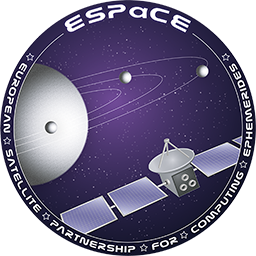Past projects
Projects with IMCCE PI‑ship
ESPaCE/ESPaCE-2
 ESPaCE‑2 is the extension until 2020 of the European project FP7-ESPaCE (European Satellite Partnership for Computing Ephemerides, 2011-2015). This project is coordinated by IMCCE since 2011 and associates four of the seven partners from ESPaCE: IMCCE, TUB (Technische Universität Berlin ), TUD (Technical University of Delft), JIVE-ERIC (Joint Institute for VLBI in Europe). The goal is mainly to cooperate for the improvement or the development of ephemerides of natural satellites by exploiting new space based or ground based data issued either from archives or from observing campaigns.
ESPaCE‑2 is the extension until 2020 of the European project FP7-ESPaCE (European Satellite Partnership for Computing Ephemerides, 2011-2015). This project is coordinated by IMCCE since 2011 and associates four of the seven partners from ESPaCE: IMCCE, TUB (Technische Universität Berlin ), TUD (Technical University of Delft), JIVE-ERIC (Joint Institute for VLBI in Europe). The goal is mainly to cooperate for the improvement or the development of ephemerides of natural satellites by exploiting new space based or ground based data issued either from archives or from observing campaigns.
Projects with IMCCE involvement
NEOShield: Earth Space Environment
 The European project NEOShield aims at performing scientific research and technical development to reduce the geo-risk from Near-Earth Objects (NEOs) impact. NEOshield brings together several partners in a research consortium to lead technological and scientific developments around the mitigation of near-Earth asteroid hazards. The objective is to provide technological developments for kinetic impactors or other type of space missions to deflect a threatening asteoid, and to provide a better characterization of NEO properties. In particular, the rotation periods of target asteroids were obtained from observation campaigns on ground telescopes; validation of the deviation senarios is carried out by the Post-Mitigation Risk Assessment Tool (PMiRA). Based on this research, NEOTwIST offers a demonstration mission and the Impact calculator tool. These studies are funded by the European Commission in its FP7 and H2020 framework programs, their results are available here: NEOShield1 and NEOShield2.
The European project NEOShield aims at performing scientific research and technical development to reduce the geo-risk from Near-Earth Objects (NEOs) impact. NEOshield brings together several partners in a research consortium to lead technological and scientific developments around the mitigation of near-Earth asteroid hazards. The objective is to provide technological developments for kinetic impactors or other type of space missions to deflect a threatening asteoid, and to provide a better characterization of NEO properties. In particular, the rotation periods of target asteroids were obtained from observation campaigns on ground telescopes; validation of the deviation senarios is carried out by the Post-Mitigation Risk Assessment Tool (PMiRA). Based on this research, NEOTwIST offers a demonstration mission and the Impact calculator tool. These studies are funded by the European Commission in its FP7 and H2020 framework programs, their results are available here: NEOShield1 and NEOShield2.
Research groups
Labex ESEP
ESEP is the French acronym of “Exploration Spatiale des Environnements Planétaires”, or “Space Exploration of Planetary Environments”. The idea of ESEP is to serve as a lever for collaboration and synergy between nine Space Exploration and Technology laboratories in and around Paris and Orléans, France. The strategic goal is to connect and exploit complementary know-how between the laboratories and foster R&D projects for new space instrumentation, projects that could not otherwise exist.
IRIS OCAV
Whether life is singular or abundant in the universe has been a central question since the oldest times. It resonates in the background with fundamental questions that have been the subject of passionate and sometimes irrational debates throughout time: what is life, how can life emerge spontaneously from non-living systems, what is the probability that life will emerge, what are the conditions for the emergence of life, are they unique to the Earth or multiple in the universe, can we find it if it is the case? The OCAV project addresses these outstanding questions at the level of PSL Research University by stimulating and focusing the work of a pluri-disciplinary community of researchers expressing their interest in this area
Last update Wednesday 22 February 2023